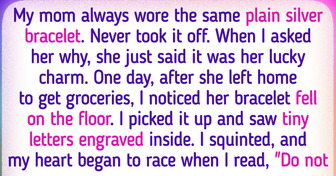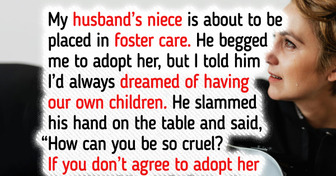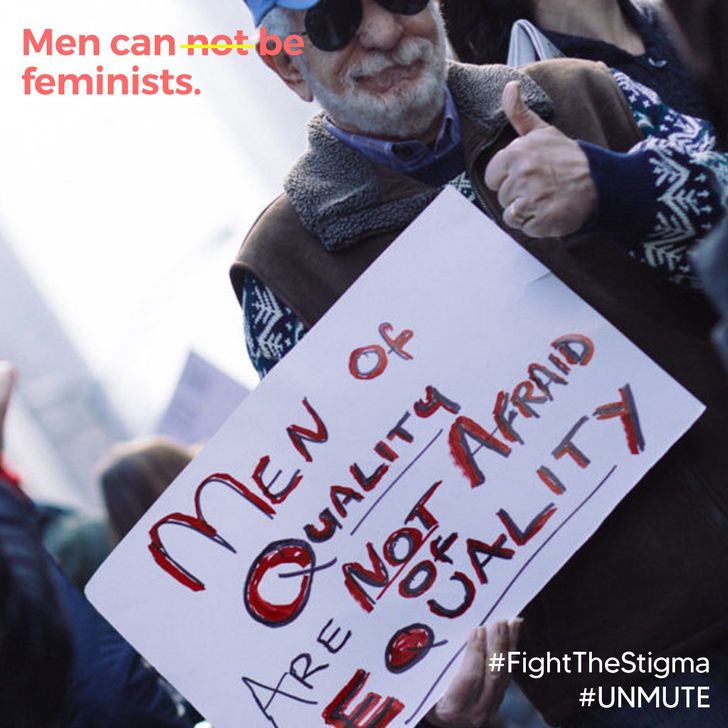Wow. I've never experienced this with boys because they cry a lot after they're hurt.
What Toxic Masculinity Is and Why Men and Their Loved Ones Suffer From It
The difference between men and women does exist but it’s not as big as it’s believed to be. And, of course, these differences are no reason to say that one of the sexes is better than the other. In most cases, gender prejudice is related to women, but men also suffer from discrimination. Saying that “boys don’t cry” is just one example of toxic masculinity — a set of rules for men that continually prevents them from living life to the fullest.
At Bright Side, we’re sure that the time has come to change our ideas about how a man can or cannot behave, and now we’re going to describe what is wrong with the “code of a real man.” We will illustrate these points with images from the photo project from the Renaissance Youth Leaders Forum. Its purpose is to eliminate gender stereotypes. And at the end of the article, you’ll find a bonus that includes a few stories about how difficult it can be to be a man.
The desire to be a “real man” often means taking risks, dominating, and never showing emotions and feelings. But these are signs of weakness that hurt both men and their loved ones. Those who share traditional beliefs about masculinity find it more difficult to maintain trusting relationships with their spouses and children. And their inability to always be the best leads to mental health problems, such as depression, and stress. Such men prefer to ignore the signals of their own body and endure pain, neglecting to call a doctor. This leads to the fact that a man’s lifespan is, on average, shorter than that of a woman.
Still, many people find the image of an alpha male favorable, regardless of gender. And vice versa — if a man tells his child that he loves him or cries over a touching film, he can expect to hear that he “behaves like a girl.”
Those who openly express their feelings and emotions face ridicule and even contempt. And they have to make a choice: either wear a mask of “a tough guy” or “not be a man.”
And yet, traditional gender roles that label a man as a belligerent victor and head of the family and a woman, a gentle and fragile guardian of the home who needs protection, are gradually becoming obsolete. Men continue to feel that they can make decisions not under the pressure of social norms, but by their own choice. There are countries where the dismissal of stereotypic roles is encouraged by the state, like in Sweden and Norway, for example, where 3 to 18 months of maternity leave must be taken by the second parent.
Men around the world have realized that this is a time of change, and they find more and more support. Dinner parties for men are gaining popularity, serving as a place where they can discuss topics that they usually avoid, even with their close friends. The British project, “The Campaign Against Living Miserably” teaches them to seek psychological help. Psychologists and volunteers from the male community of ManKind Project help them understand the cause of their aggression, recognize their emotions, and express their feelings. And the American Psychological Association has issued guidelines for psychologists who work with boys and men to help them develop new, healthy forms of masculinity.
At the core of this new masculinity is the notion that any discrimination is unacceptable. We all experience feelings and have desires, and no one can be limited in their right to express them. Any prejudice against anyone who is different should remain in the past.
Bonus: Internet users’ stories
- I was at my father’s house in the countryside yesterday. My mother died 10 years ago, and he moved there after that. He got himself hens, goats, and a cow. I asked him many times why he needed all of this, and he always laughed it off. So, we were sitting together on the porch yesterday, and I saw tears in his eyes. I asked him, “Dad, what’s wrong?” And he said, “Your mom always wanted to own a farm but I was against it. I used to say that I didn’t want to live in the countryside because I loved city life much better. But when she died, I realized why she wanted to leave the city so much. I lost my wife and didn’t listen to her. I couldn’t give her what she wanted. And now I’m here, and she’s there (he pointed at the sky). I just want her to see that I fulfilled her dream.” He stood up, wiped his tears, and went on chopping wood. And I remained sitting and thinking that my father had kept this to himself for so many years, and I had had no idea how he really felt. I suddenly felt ashamed for all my jokes about his farm and country house and shed a few tears myself. © Batya121 / Pikabu
- Once, my son came back home with his knee bleeding. His friend Andy was with him. Me: “Does it hurt?” Son: “It’s okay. It just stings a bit.” Me: “Go to the bathroom. We need to take care of your injury.” We went there, and my son whispered, “Mom, tell Andy to wait for me outside.” Andy left,
I returned to my son, and he suddenly burst into tears so pitifully that I even got scared. “Son, what’s wrong? What happened?” He said, “It hurts so much. I wanted to cry but couldn’t do it in front of the boys.” I hugged my crying man, kissed the top of his head, and thought, “It’s so difficult to be a man. You have to hold it in when you feel pain, you have to smile when you want to cry, and you can’t show your weaknesses. And it doesn’t matter how old you are, whether it’s 7, 12, or 38 because men never cry.” © TatianKa73 / Pikabu
- I remember when I was 6 years old, I played on the construction site, fell on a concrete beam, and broke my head. While I was walking home, I thought about just 2 things: If I tilt my head, my brain will leak out, and not to cry. So, I’m walking, bleeding, and repeating to myself, “Don’t tilt your head, don’t cry, don’t tilt, don’t cry.” And nobody helped me. They probably thought that a bleeding 6-year-old boy dragging himself along the street was an ordinary thing. © LazyFatCat / Pikabu
- When I hear someone saying to a boy that men don’t cry, I want to explode with indignation. Yes, if a person is a whiner, it’s bad, but tears are not a sign of weakness. They’re a natural reaction to the pains of the mind and the body. Strength is manifested by actions, not by the lack of tears. © Lolka2002 / Pikabu
- I can’t cry, even if I want to. I just walk around with a gloomy face, keeping everything inside. © Teth / Pikabu
What do you think about men who express their feelings and emotions openly? Share your opinion in the comments below.
Comments
hi every one its time that i vent out to the community of bright side ... its 2years now since ive been told by my then girlfriend that our beautiful baby was no longer .... she had passed away.... she told me after two months after the burial , i did not even attend the funeral ... cause i was never informed during that period .. she doesnt even wanna discuss the situation ... when i ask her , everyday i drown my self with tears... its really pains me as a father that even today i dont know where is my baby... we are really helpless as fathers that we must not resolve into violents .... so if any one in the world who can help or have face similar situations please in box me on my face book page ....

Men who hide their feelings are cowards and those who show sadness are brave and resilient
Related Reads
I Kicked My Friends Out of My Home After Their Daughter’s Tantrum

I Refuse to Let My Irresponsible Stepdaughter Exploit Her Dad

My Husband Kept Telling Me That My Body Stinks, I Just Found Out Why He Did It and I’m Raging

12 Secrets That Played Out Like an Oscar-Winning Drama

I Confiscated My Daughter’s Phone to Set Boundaries, but Her Reaction Shattered Me

I Warned My Sister About Her New Boyfriend, but She Didn’t Listen—Today, She Filed for Divorce

I Won't Sacrifice My Hobbies to Be a Free Babysitter

I Refused to Travel With a Man Who Treated My Kids Like Baggage

20+ Situations Where People’s Honesty Reached Its Peak

12 Big Purchases That Led to Unexpected Consequences

15+ Stories That Prove Moms’ Love Tank Never Runs Empty

I Refused to Adopt My Husband’s Niece — Now He Says I’m Heartless




